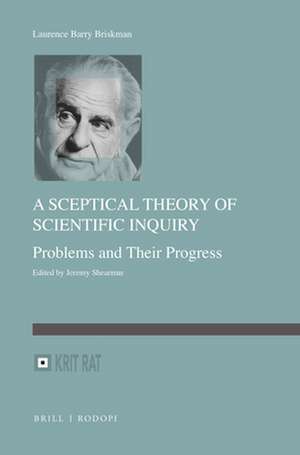A Sceptical Theory of Scientific Inquiry: <i>Problems and Their Progress</i>: Schriftenreihe zur Philosophie Karl R. Poppers und des Kritischen Rationalismus / Series in the Philosophy of Karl R. Popper and Critical Rationalism, cartea 23
Autor Laurence Barry Briskman Editat de Jeremy Shearmuren Limba Engleză Hardback – 3 iun 2020
Preț: 546.41 lei
Preț vechi: 666.35 lei
-18% Nou
Puncte Express: 820
Preț estimativ în valută:
104.55€ • 109.17$ • 86.34£
104.55€ • 109.17$ • 86.34£
Carte indisponibilă temporar
Doresc să fiu notificat când acest titlu va fi disponibil:
Se trimite...
Preluare comenzi: 021 569.72.76
Specificații
ISBN-13: 9789004429192
ISBN-10: 9004429190
Dimensiuni: 155 x 235 mm
Greutate: 0.48 kg
Editura: Brill
Colecția Brill
Seria Schriftenreihe zur Philosophie Karl R. Poppers und des Kritischen Rationalismus / Series in the Philosophy of Karl R. Popper and Critical Rationalism
ISBN-10: 9004429190
Dimensiuni: 155 x 235 mm
Greutate: 0.48 kg
Editura: Brill
Colecția Brill
Seria Schriftenreihe zur Philosophie Karl R. Poppers und des Kritischen Rationalismus / Series in the Philosophy of Karl R. Popper and Critical Rationalism
Cuprins
Editorial Note
Editorial Introduction
Larry Briskman: Biographical Note
Larry Briskman’s Publications
Guide to Abbreviations
Acknowledgements
Introduction: Two Types of Evolution
1 The Rationality of Science
1.1 The ‘Initial’ and ‘Transcendental’ Strategies
1.2 Philosophy as Explication: Critical Remarks
1.3 Methodology – Normative or Naturalistic?
1.4 The Two Strategies and the Naturalistic Approach
1.5 Conclusion
2 Scientific Method and Scientific Progress
2.1 The Problem of the Justification of a Method (or, The Generalised Problem of Induction)
2.2 The Generalised Problem of Induction and Popper’s Theory of Method
2.3 Three Apparent Objections to (PR")
2.4 ‘Transcendentalism’ and Naturalism Re-visited
2.5 The Relation of Rationality to Choice
2.6 A Summary of the Argument So Far
2.7 Explaining the Success of Science
2.8 The Method of Strengthening Demands – Further Remarks
2.9 Conclusion
3 Methodology and the Context of Inquiry
3.1 The Context of Discovery and the Context of Justification
3.2 Three Crucial Distinctions
3.3 Towards a Non-psychologistic Context of Production (I)
3.4 Towards a Non-psychologistic Context of Production (II)
3.5 Conclusion – Methodology as the Theory of Rational Inquiry
4 Articulating Our Ignorance – Hopeful Scepticism and the Meno Paradox
4.1 Some ‘Popperian’ Preliminaries
4.2 Justificationism and the Problem of Diversity
4.3 Justificationism, Scepticism, and Relativism
4.4 Justificationism, Socratic Scepticism, and the Meno Paradox
4.5 TDSK – A Socratic Sceptical Solution to the Meno Paradox
4.6 Conclusion
5 Against ‘tacit knowing’
5.1 Three Questions Concerning
5.2 Against: ‘Tacit Knowing’
5.3 Conclusion
6 Beyond TDSK
6.1 The Kuhnian Objection
6.2 The Problem of Content
6.3 A Plausibility Argument for (D4)
6.4 Beyond TDSK 2
Bibliography
Index of Names
Index of Subjects XX
Editorial Introduction
Larry Briskman: Biographical Note
Larry Briskman’s Publications
Guide to Abbreviations
Acknowledgements
Introduction: Two Types of Evolution
1 The Rationality of Science
1.1 The ‘Initial’ and ‘Transcendental’ Strategies
1.2 Philosophy as Explication: Critical Remarks
1.3 Methodology – Normative or Naturalistic?
1.4 The Two Strategies and the Naturalistic Approach
1.5 Conclusion
2 Scientific Method and Scientific Progress
2.1 The Problem of the Justification of a Method (or, The Generalised Problem of Induction)
2.2 The Generalised Problem of Induction and Popper’s Theory of Method
2.3 Three Apparent Objections to (PR")
2.4 ‘Transcendentalism’ and Naturalism Re-visited
2.5 The Relation of Rationality to Choice
2.6 A Summary of the Argument So Far
2.7 Explaining the Success of Science
2.8 The Method of Strengthening Demands – Further Remarks
2.9 Conclusion
3 Methodology and the Context of Inquiry
3.1 The Context of Discovery and the Context of Justification
3.2 Three Crucial Distinctions
3.3 Towards a Non-psychologistic Context of Production (I)
3.4 Towards a Non-psychologistic Context of Production (II)
3.5 Conclusion – Methodology as the Theory of Rational Inquiry
4 Articulating Our Ignorance – Hopeful Scepticism and the Meno Paradox
4.1 Some ‘Popperian’ Preliminaries
4.2 Justificationism and the Problem of Diversity
4.3 Justificationism, Scepticism, and Relativism
4.4 Justificationism, Socratic Scepticism, and the Meno Paradox
4.5 TDSK – A Socratic Sceptical Solution to the Meno Paradox
4.6 Conclusion
5 Against ‘tacit knowing’
5.1 Three Questions Concerning
5.2 Against: ‘Tacit Knowing’
5.3 Conclusion
6 Beyond TDSK
6.1 The Kuhnian Objection
6.2 The Problem of Content
6.3 A Plausibility Argument for (D4)
6.4 Beyond TDSK 2
Bibliography
Index of Names
Index of Subjects XX
Notă biografică
Laurence Barry Briskman, Ph.D. 1983, University of Edinburgh, taught Philosophy at the University of Edinburgh up until 1993. He passed away in 2002.
Jeremy Shearmur, Ph.D. 1986, London School of Economics and Political Science, taught Philosophy at Edinburgh, Political Theory at Manchester, and was Lecturer, then Reader, in Political Theory and Philosophy at the Australian National University; currently he is Emeritus Fellow at the Australian National University.
Jeremy Shearmur, Ph.D. 1986, London School of Economics and Political Science, taught Philosophy at Edinburgh, Political Theory at Manchester, and was Lecturer, then Reader, in Political Theory and Philosophy at the Australian National University; currently he is Emeritus Fellow at the Australian National University.



